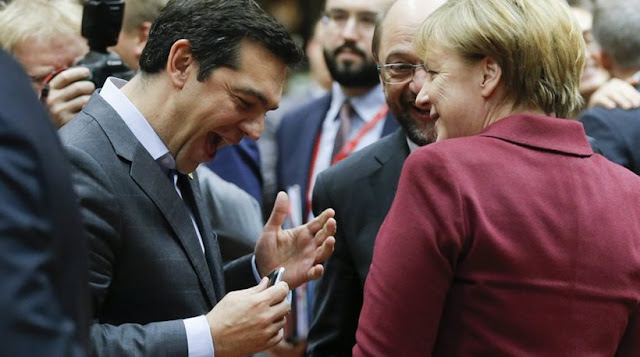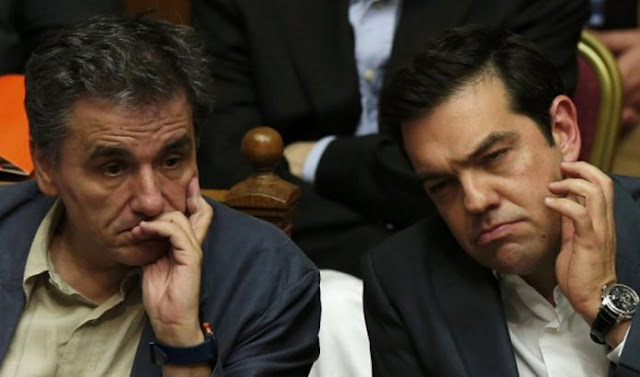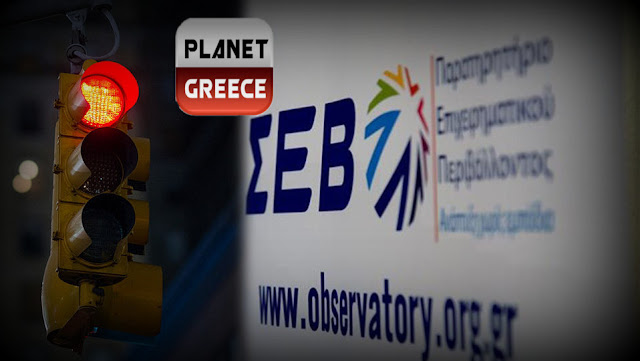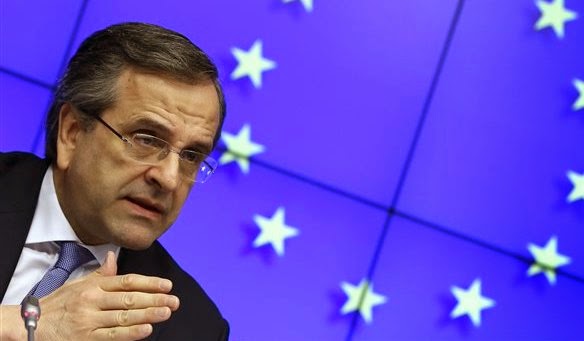Αίσθηση προκαλεί τηλεγράφημα της αμερικανικής πρεσβείας για τη συνάντηση του Γιώργου Παπανδρέου με τον Αμερικανό γερουσιαστή Ντέρμπιν (Durbin) και τον τότε πολιτευτή των Δημοκρατικών στις ΗΠΑ, Αλέξη Γιαννούλια, το Φεβρουάριο του 2009, που δημοσιοποίησε το Wikileaks.
Μεταξύ άλλων, ο Γιώργος Παπανδρέου εμφανίζεται να λέει ότι...
αισθάνεται πολύ κοντά στις ΗΠΑ, τη γενέτειρα του, τις οποίες και χαρακτήρισε ως «τη μοναδική δύναμη στον κόσμο» που μπορεί να ηγηθεί των δημοκρατικών αξιών. Εξέφρασε παράλληλα τον θαυμασμό του για το τότε αμερικανικό οικονομικό πακέτο αλλά και την δυσαρέσκειά του για τη γερμανική στάση στην οικονομική κρίση, ενώ έθεσε και θέμα καθυστέρησης συνολικά της ΕΕ στην αντιμετώπισή της. Ο τότε ηγέτης της αντιπολίτευσης –πάντα σύμφωνα με το Wikileaks- πρόσθεσε ότι ως πρόεδρος της Σοσιαλιστικής Διεθνούς συντέλεσε στις προσπάθειες για ειρηνική διευθέτηση των κρίσεων στο μουσουλμανικό κόσμο και την αντιμετώπιση της τρομοκρατίας, καθώς και ότι είναι ανοιχτός σε αμερικανικές ιδέες αν υπάρχουν τρόποι για να βοηθήσει στη δημιουργία διασυνδέσεων με διαφωνούντες (με την αμερικανική πολιτική) ηγέτες οπουδήποτε στη Λατινική Αμερική και οπουδήποτε στον κόσμο. Εκτός αυτού εμφανίζεται να δηλώνει πως παρά το ότι η Ελλάδα είναι μια «μικρότερη χώρα», μπορεί να συνεισφέρει στη σταθερότητα με τις γειτονικές περιοχές, ενώ τόνισε τις ιστορικές
σχέσεις της χώρας μας με τον μουσουλμανικό κόσμο. Ο Γιώργος Παπανδρέου εμφανίζεται να αναφέρει ότι δεν είναι υπέρ του κρατικού προστατευτισμού στην οικονομία, αλλά υπέρ της σοσιαλδημοκρατικής οπτικής ότι οι αγορές πρέπει να είναι ανοιχτές, αλλά να διέπονται από κανόνες ώστε να ενθαρρύνεται η ανάπτυξη. Παράλληλα φαίνεται να λέει ότι θα ήθελε να δει ένα οργανισμό σαν το ΔΝΤ να δραστηριοποιείται περισσότερο στο να θέσει αυστηρούς διεθνείς κανόνες για τη χρηματο-οικονομική ανάπτυξη για να «δούμε τον πλανήτη όπως θέλουμε», συμπεριλαμβανομένης της πιο εκτεταμένης χρήσης των ανανεώσιμων πηγών ενέργειας.
Τέλος, φαίνεται να δηλώνει ότι η προτεραιότητά του εάν εκλεγεί θα είναι η αντιμετώπιση της οικονομικής κατάστασης.
Το κείμενο υπογράφει ο τότε αμερικανός πρεσβευτής στην Αθήνα, Ντάνιελ Σπέκχαρτ.
Oλόκληρο το κείμενο από το Wikileaks:
Reference id: 09ATHENS250
Origin: Embassy Athens
Time: Thu, 26 Feb 2009 11:06 UTC
Classification: UNCLASSIFIED//FOR OFFICIAL USE ONLY
Highlight:
VZCZCXRO3130 OO RUEHIK RUEHPOD RUEHYG DE RUEHTH #0250/01 0571106 ZNR UUUUU ZZH O 261106Z FEB 09 FM AMEMBASSY ATHENS TO RUEHC/SECSTATE WASHDC IMMEDIATE 3283 INFO RUEHZG/NATO EU COLLECTIVE
UNCLAS SECTION 01 OF 02 ATHENS 000250 SENSITIVE SIPDIS E.O. 12958: N/A TAGS: PREL [External Political Relations] PGOV [Internal Governmental Affairs] ECON [Economic Conditions] OVIP [Visits and Travel of Prominent Individuals and Leaders] ENRG [Energy and Power] TU [Turkey] GR [Greece; Crete] SUBJECT: CODEL DURBIN'S MEETING WITH GREEK OPPOSITION LEADER PAPANDREOU REF: ATHENS 207 Summary ------- ¶1. (SBU) In a wide-ranging discussion February 18, Senator Durbin and main opposition PASOK party president George Papandreou shared views on the global economic crisis, Cyprus, Greek-Turkish relations, Afghanistan, and other issues. They agreed that the international goodwill surrounding the new U.S. administration provided an opportunity to make lasting reforms in the global economy -- including expansion of renewable energy -- and to improve the global image of the U.S. Papandreou stressed the "closeness" he feels with the U.S., the country of his birth, and he argued that the U.S. is "the only power in the world" able to take the lead in promoting our shared democratic values. He added that Greece would be ready to do its part under a future PASOK government. Papandreou expressed admiration for the recently signed U.S. economic stimulus package, and said he wished the EU would consider something similar. Unfortunately, he said, Germany had taken the lead in holding back the EU's reaction to the economic crisis, based on what Papandreou considered a misguided commitment to fiscal rules that made little sense in a recession. Noting his role as current head of the Socialist International, Papandreou explained his work with leaders in the Muslim world and elsewhere to find peaceful ways to resolve disputes and to deal with terrorism. He said he would be open to U.S. ideas if there were ways he could help build connections to confrontational leaders anywhere in the world. End Summary.
"Time to Work Together" ----------------------- ¶2. (SBU) Papandreou began the meeting with Senator Durbin, Illinois Treasurer Alexi Giannoulias, and the Ambassador by offering congratulations for the election of President Obama and by noting how his own life story was deeply connected with the U.S. (including a year Papandreou spent in high school in Elmhurst, Illinois). Durbin noted the wide range of challenges facing the new administration, including the global economic crisis, Iraq, and Afghanistan. Durbin also shared impressions of his recent visit to Cyprus, including the prospects for progress this year in the negotiations, as well as weaknesses in civil society. Papandreou thanked Durbin for his work in the Senate on Greek-Turkish relations and other issues of importance to Greece. Papandreou said that now is the time for us to work together, and he endorsed what he called President Obama's "message to world" to solve our common problems. Papandreou said that although Greece is a "smaller country," it can contribute to stability in surrounding regions, and he noted in particular Greece's historic relationships with the Muslim world.
¶3. (SBU) Durbin noted the importance of President Obama's first Executive Order on Guantanamo, torture, and ensuring humane standards for rendition, and Papandreou expressed strong support, adding that he had publicly used the President's statement about security and freedom not being mutually exclusive. He agreed that there is currently an opportunity for the U.S. to create a different image around the world, observing that in the past it was easy for groups opposed to our shared democratic values to point to torture as a way to discredit the U.S. Papandreou said that while the U.S. could not "dictate solutions," it was the "only power in the world that can lead" in promoting our values. Papandreou said we would have his support in this effort.
Seeking a Large EU Stimulus --------------------------- ¶4. (SBU) Papandreou said that early parliamentary elections were a real possibility in Greece, and he noted that opinion polls showed PASOK would likely win. He stressed that the current government had been weakened by internal and external crises, and Greece needed a new government that would have the credibility with society to make difficult decisions and to mobilize people. Telling the delegation "we can work with you," Papandreou noted that his top priority in government would be the same as President Obama's: dealing with the economic situation. Papandreou said it would be in the interest of both Greece and the U.S. to push the EU to consider a larger stimulus package on the model of the U.S. stimulus. He said the EU should do its part to encourage investment for the good of the global economy. Papandreou lamented that the EU's cumbersome rules and the opposition of key members -- especially an overly inflation-phobic Germany -- had constrained the EU response to the crisis. He called for the EU to relax its "master criteria" that require member states to run no more than a 3 percent budget deficit, arguing that these rules made no sense in a recession. He also expressed support for ending disparities in interest rates for loans within the euro zone. ATHENS 00000250 002 OF 002
¶5. (SBU) Durbin noted that energy independence was a key goal of the U.S. stimulus, and that the package's investment in renewable energy had resonated with the U.S. public. Papandreou agreed, noting it would be possible "to power Greece only with wind." He expressed support for new windmills based on traditional Greek designs, so that tourist areas would embrace them as part of the Greek "brand" rather than opposing them as an eyesore. He added that Greece had the potential to do more with solar, water, and geothermal power. Papandreou also agreed with the Ambassador's suggestion that Greece look at developing its communication infrastructure, noting the economic benefits of expanding broadband access.
¶6. (SBU) Asked by Durbin for his views on trade, Papandreou emphasized that he was not a protectionist, but instead took the social democratic view that markets should be open but governed by rules to encourage development. He said he would like to see an organization like the IMF that would do more to put clear, strict international rules on financial development, "geared toward where we want to move the planet," including greater use of renewable energy. He expressed support for "incentives for free competition" in the WTO that would over time improve the poor conditions that workers currently face in many poor countries. Papandreou said both the U.S. and EU should be more open for trade in agriculture. He noted that Greece could do well as a niche producer of high-quality agricultural goods in a more competitive market.
¶7. (SBU) Giannoulias asked about the alarming growth in Greece's public debt, and Papandreou agreed it was a problem, unlike private debt and toxic assets, two problems Greece had largely managed to avoid. Papandreou said Greece lacked of competitiveness, and this could be dealt with through modernization, including moving toward a green economy. He noted that Greece was made more vulnerable to the global financial crisis because its banks had invested heavily in the Balkans. He peppered the delegation with questions about how the U.S. was responding to the current economic challenges in the areas of real estate, unemployment, and public transportation. Durbin and Giannoulias noted the importance of infrastructure investment as part of the U.S. stimulus.
Papandreou's International Outreach ----------------------------------- ¶8. (SBU) Papandreou said his position as leader of the Socialist International had given him access to a wide range of leftist parties around the world, some in power and some not. Noting that he had helped eastern European communist parties to democratize after the fall of the Berlin Wall, Papandreou said he would be willing to reach out to confrontational leaders in Latin America or elsewhere in the world if the U.S. thought he could be of use in building connections. Papandreou noted that the Socialist International had brought together Palestinian and Israeli parties to discuss peace plans, and that he had discussed with Pakistani President Zardari the idea of setting up a committee to find ways to isolate terrorist groups without relying solely on force. Papandreou added that he had doubts about the wisdom of Zardari's recent cease-fire agreement that permits Sharia law in parts of Pakistan, but he understood that Zardari was in a difficult situation. Papandreou said he had developed contacts with such countries as Syria and Iran during his tenure as Foreign Minister (1999-2004).
¶9. (SBU) Turning to Turkey and Cyprus, Papandreou stressed that as Foreign Minister he and his Turkish counterpart, the late Ismail Cem, had launched a new era in bilateral relations, based in part on a significant increase in person-to-person contacts. These started with mutual assistance efforts following earthquakes in both countries in 1999 and continued with exchanges in music, soccer, business, and local government. By the initiative's second year, Papandreou said, there were so many cross-border civil society activities that it was impossible to count them. He said he had promoted similar efforts in Cyprus, including a high-profile case in which a Turkish Cypriot boy with leukemia had been matched with a Greek Cypriot donor. These initiatives stopped after the failed referendum in Cyprus in ¶2004. Papandreou said it would be important to push on initiatives such as these when PASOK is back in power. If the leadership empowers people to establish contacts, he said, those contacts will happen.
¶10. (U) CODEL Durbin departed post prior to clearing this cable. SPECKHARD
 Τράβηξε το αυτί του Τσίπρα η Μέρκελ κι εκείνος... χαχάνιζε! [εικόνες]
Τράβηξε το αυτί του Τσίπρα η Μέρκελ κι εκείνος... χαχάνιζε! [εικόνες] MNI: E.E. και δανειστές θα είχαν αποδεχθεί τα μέτρα Τσίπρα, εάν είχαν ενημερωθεί
MNI: E.E. και δανειστές θα είχαν αποδεχθεί τα μέτρα Τσίπρα, εάν είχαν ενημερωθεί Ο ΣΕΒ "καρφώνει" Τσίπρα για τον μποναμά - πείνας στους συνταξιούχους
Ο ΣΕΒ "καρφώνει" Τσίπρα για τον μποναμά - πείνας στους συνταξιούχους ΑΠΟΚΛΕΙΣΤΙΚΟ: Έτοιμοι για GREXIT! Επέστρεψε εκτάκτως ο Σαμαράς στην Ελλάδα!
ΑΠΟΚΛΕΙΣΤΙΚΟ: Έτοιμοι για GREXIT! Επέστρεψε εκτάκτως ο Σαμαράς στην Ελλάδα!

Τράβηξε το αυτί του Τσίπρα η Μέρκελ κι εκείνος... χαχάνιζε! [εικόνες]
Γελάκια, γκριμάτσες, αγκαλίτσες και... χορατά, από...ΔΕΙΤΕ ΕΔΩ

E.E. και δανειστές θα είχαν αποδεχθεί τα μέτρα Τσίπρα, εάν είχαν ενημερωθεί
«Βιαστική» και «ανακριβή» χαρακτηρίζουν πηγές της...ΔΕΙΤΕ ΕΔΩ

Ο ΣΕΒ "καρφώνει" Τσίπρα για τον μποναμά - πείνας στους συνταξιούχους
Κίνηση «υψηλού πολιτικού ρίσκου, που ξαναφέ...ΔΕΙΤΕ ΕΔΩ

ΑΠΟΚΛΕΙΣΤΙΚΟ: Έτοιμοι για GREXIT! Εκτάκτως ο Σαμαράς στην Ελλάδα!
Ο Αντώνης Σαμαράς ήταν χθες στις Βρυξέλλες, προκει...ΔΕΙΤΕ ΕΔΩ
Εγγραφή σε:
Σχόλια ανάρτησης (Atom)



Δεν υπάρχουν σχόλια:
Δημοσίευση σχολίου
Για να αποφευχθούν περιπτώσεις εμφάνισης υβριστικών σχολίων ή άλλων ποινικά κολάσιμων πράξεων, όλα τα σχόλια πριν δημοσιευτούν ελέγχονται.
Παρακαλούμε μην αποστέλετε πληροφορίες άχρηστες προς τη λειτουργία του συγκεκριμένου blog.
Τα μηνύματα είναι προσωπικές απόψεις των αποστολέων και σε καμία περίπτωση δεν εκφράζουν τους δημιουργούς ή διαχειριστές της συγκεκριμένης σελίδας.